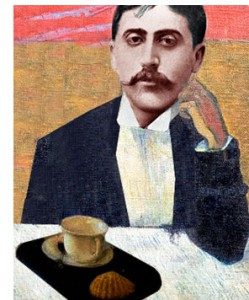The sense of smell has a conflicting relationship to memory: the memories it evokes are the most intense and emotional, while scent itself is so elusive as to seem beyond memory.
 Proust may have been the first person to describe the phenomenon of scent/taste-induced memory, a memory so complete that it feels like the return of a whole world from the past. Proust’s vivid, instantaneous recall of his childhood in Combray was famously triggered by the taste of a madeleine cookie dissolved in a teaspoon of tea, from which sprang his whole monumental novel, In Search of Lost Time.
Proust may have been the first person to describe the phenomenon of scent/taste-induced memory, a memory so complete that it feels like the return of a whole world from the past. Proust’s vivid, instantaneous recall of his childhood in Combray was famously triggered by the taste of a madeleine cookie dissolved in a teaspoon of tea, from which sprang his whole monumental novel, In Search of Lost Time.
“No sooner had the warm liquid mixed with the crumbs touched my palate than a shudder ran through me and I stopped, intent upon the extraordinary thing that was happening to me. An exquisite pleasure had invaded my senses, something isolated, detached, with no suggestion of its origin…
And suddenly the memory revealed itself. The taste was that of the little piece of madeleine which on Sunday mornings at Combray… my aunt Léonie used to give me, dipping it first in her own cup of tea or tisane. The sight of the little madeleine had recalled nothing to my mind before I tasted it; perhaps because I had so often seen such things in the meantime, without tasting them, on the trays in pastry-cooks’ windows, that their image had dissociated itself from those Combray days to take its place among others more recent… But when from a long-distant past nothing subsists, after the people are dead, after the things are broken and scattered, taste and smell alone, more fragile but more enduring, more unsubstantial, more persistent, more faithful, remain poised a long time, like souls, remembering, waiting, hoping, amid the ruins of all the rest; and bear unflinchingly, in the tiny and almost impalpable drop of their essence, the vast structure of recollection.
And as soon as I had recognized the taste of the piece of madeleine soaked in her decoction of lime-blossom which my aunt used to give me…immediately the old grey house upon the street, where her room was, rose up like a stage set to attach itself to the little pavilion opening on to the garden…and with the house the town, from morning to night and in all weathers, the Square where I used to be sent before lunch, the streets along which I used to run errands, the country roads we took when it was fine. And as in the game wherein the Japanese amuse themselves by filling a porcelain bowl with water and steeping in it little pieces of paper which until then are without character or form, but, the moment they become wet, stretch and twist and take on colour and distinctive shape, become flowers or houses or people, solid and recognizable, so in that moment all the flowers in our garden and in M. Swann’s park, and the water-lilies on the Vivonne and the good folk of the village and their little dwellings and the parish church and the whole of Combray and its surroundings, taking shape and solidity, sprang into being, town and gardens alike, from my cup of tea.” (translation by Moncrieff and Kilmartin)
Why smell and taste are triggers for such intense, rich, and emotional memories may be explained by the fact that the olfactory cortex in the brain is directly linked to the hippocampus, where memory resides. In contrast, information from sight, hearing, and touch must go through the thalamus before reaching the memory center of the brain. Smell is also unique, as research shows, in that the first exposure to a scent and its association to an image is the most powerful and long lasting; with the other senses, in contrast, repetition increases our ability to remember. Researchers hypothesize that intense memories triggered by scent may so often be childhood ones because it is then that we have the most frequent first exposures to scents.
Most important in the connection between smell and memory is that smell is the sense that we are least able to describe. Unlike color, smell does not fit on a scale. For the most part, we describe scent through simile—something smells like a musty closet or like freshly mowed grass. Most of the names we have for aromas are just the things that produces them: banana, asphalt, pine. Some say that we humans discredit smell, associate it with shame, and so focus on sight and sound. In any case, smell is the most primitive of the senses, the way that bacilli sense danger. Many animals use it exclusively; many use it primarily. It is the earliest sense babies develop.
But the fact that we associate smells to experience without the aid of words seems to me to be the key to the apparent conflict in the smell+memory connection. Putting a word to a thing is a kind of translation: we convert the thing itself into an abstraction, into a reduced but memorable version of itself. On the one hand, words are a hook with which we can seize a thing, categorize it, file it away for later retrieval. On the other hand, words interfere in our ability to relate directly, experientially, emotionally to a thing.
Something Tom Stafford has written on the BBC website illuminates this: “Memory research has shown that describing things in words can aid memory, but it also reduces the emotion we feel about the subject. When we come up with a story about our memories, we start remembering the story as much as the raw experience.” He describes a powerful memory of his grandmother’s toy cupboard that he associates with a particular scent he smelled as a child: “The smell experience of the cupboard, which I have never found a name for, traveled directly into my brain, lodging next to the part specialized for encoding experiences. There it got entangled with the other memories of the cupboard, untouched by language, difficult to think about on purpose, but still lodged in my memory. Now, years later, the smell is not only enough to relive that experience but it is also enough to pull out the rest of the memories along with it.”
Perhaps the lack of words for a smell allows the memory to bypass Stafford’s—or Proust’s—more conscious, deliberate mind and to connect directly to a part more emotional and bodily encompassing. If this is true, smells may be particularly elusive to verbal types like me. Is someone doing research on this? I’d love to know.

For me, smell is a potent trigger for memories.
Also a source of pleasure. The same for taste. I have an uncanny ability to reproduce tastes and
similarly an instinctive capacity to replicate color. These two senses have served me well.